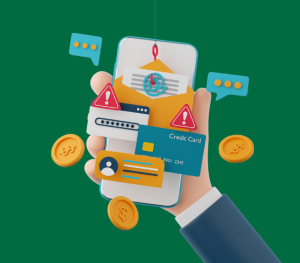Knowledge is Power
The best way to protect yourself from becoming a romance scam victim is knowing what could happen. We saw no shortage of fraud and scams in 2023. The use of artificial intelligence (AI) continues to grow, so undoubtedly we will see more in 2024.
Today is Valentine’s Day, a day for love and romance! In keeping with that theme, today’s topic is romance scams. These scammers target individuals who use social media and dating apps. Read on!
PS, don’t forget, you have a chance to win one $20 Visa gift card for every blog posted with the topics of fraud and scams this year! Take the one-question quiz at the end of each blog post about fraud and scams (like this one!). If you answer correctly, you’ll be entered for a chance to win!
Is it love?
Romance scams can be either be quick or take time. Scammers use new, but fake, relationships to steal money from people after spending days, weeks, or even months, talking to their victim online. They gain trust from their victim over time via various online conversations. Then, they ask for money or personal information. There may give a variety of reasons for needing money or your personal information:
- They claim they want to travel to meet you, their “love interest” in person, but need money for gas, plane tickets, etc.
- They say a relative or loved one is sick, hurt, or in jail.
- They ask you to do them a favor and in return they will send you money if you send your account information.
Scammers typically ask for you to pay them in ways that are harder to trace and impossible to reverse, like gift cards or apps like Venmo or Cash App. If someone you have never met ask for money in these ways, be very suspicious and proceed with caution (phone conversations and FaceTime do not count as meeting, remember that AI can be used to trick you).
Lastly, another common lie from an online “love interest”, is an offer to help you invest in cryptocurrency. While many victims of romance scams send money with a gift cards or peer to peer services, the most substantial losses — more than one-third of losses to romance scams in 2022 — were in cryptocurrency, according to the FTC.

Send a simple e-card to your online sweetie for Valentine’s Day instead of money. If you decide to meet in person, do so at a public place and make sure you tell someone where you are going and when they should expect to hear from you afterwards. Have a safe and LOVEly Valentine’s Day!
Quiz and Contest Rules
There will be a two-week timeframe from when this blog is posted to read it and take the quiz. Those with the correct answers will be entered into the drawing for that post. Winners will be contacted via the information they entered when taking the quiz. One entry per person. NorthRidge employees and their immediate family (spouses, parents, children, live-in partners), and board members, are not eligible to win. Additional giveaway rules are located here.




Recent Comments